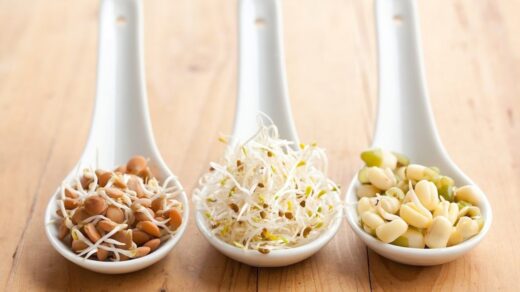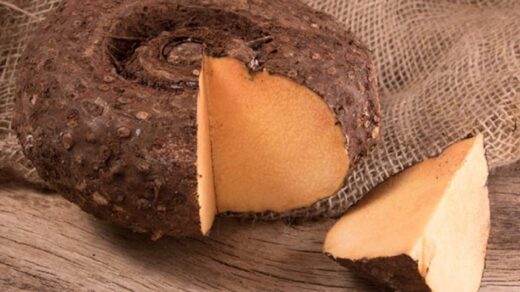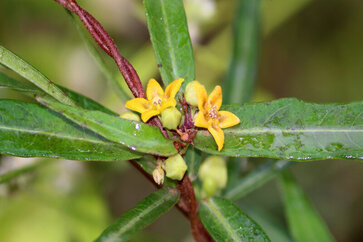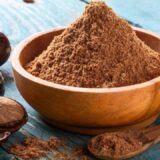Black Cumin (Kali Jeeri): Benefits,Uses, and Dosage
Kalijiri, also known as Bitter Cumin, is the seed of the Centratherum Anthelminticum plant. It has long been a key ingredient in various classical Ayurvedic formulations and is commonly combined with Ajwain and Methi to address obesity and improve digestive health. Kalijiri’s potent antibacterial properties make it effective in treating skin conditions by reducing itching and irritation.
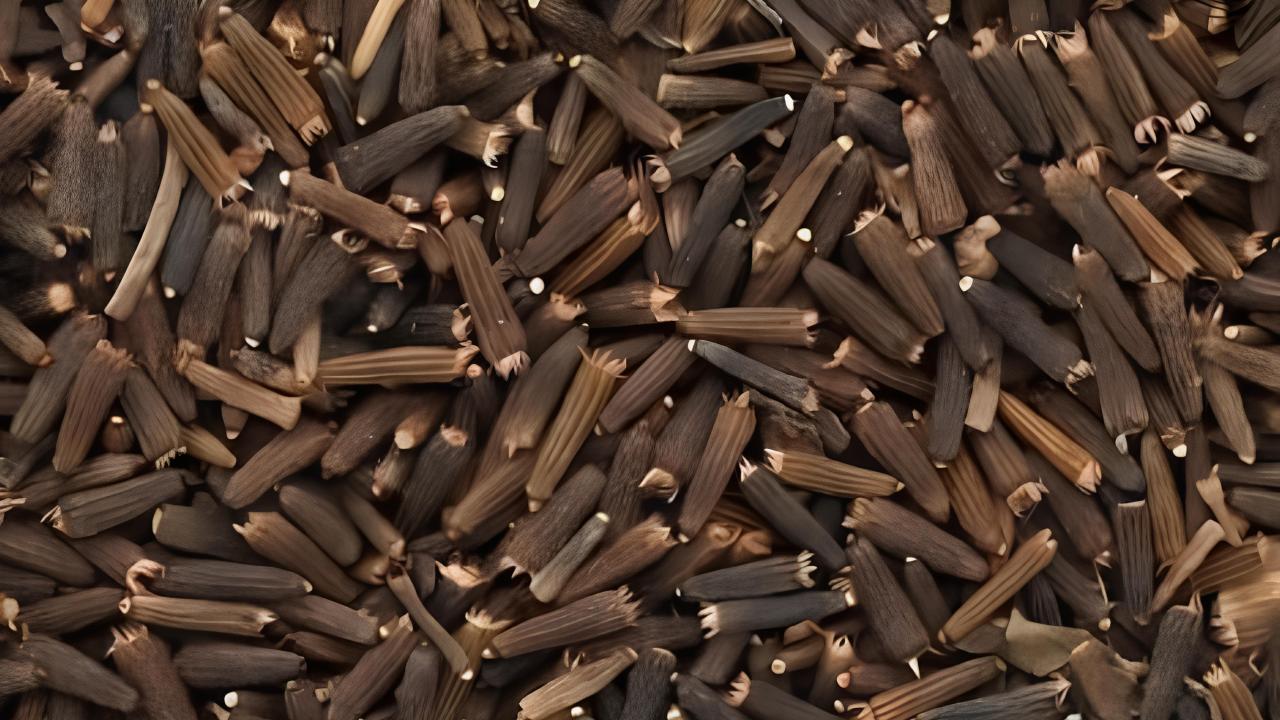 Additionally, it acts as a powerful blood purifier (or detoxifier), helping to eliminate toxins from the bloodstream and reduce the risk of various health issues. Kalijiri is also a proven remedy for intestinal worms, including roundworms, tapeworms, and threadworms. Although it can stimulate appetite, its bitter taste may cause nausea in some people.
Additionally, it acts as a powerful blood purifier (or detoxifier), helping to eliminate toxins from the bloodstream and reduce the risk of various health issues. Kalijiri is also a proven remedy for intestinal worms, including roundworms, tapeworms, and threadworms. Although it can stimulate appetite, its bitter taste may cause nausea in some people.
Kalijiri is beneficial for hair growth as it enhances blood circulation to the scalp. It also helps regulate blood glucose levels, making it particularly useful for managing postprandial hyperglycemia. The antioxidants found in Kalijiri accelerate wound healing by promoting faster contraction. According to Ayurveda, applying a paste made of Kalijiri seeds with neem or coconut oil aids in wound healing, thanks to its Kashaya (astringent) property.
Additionally, Kalijiri seeds are valuable for addressing respiratory issues like asthma, cough, and cold, owing to their bronchodilatory and anti-inflammatory effects. It is also known to be beneficial for individuals with vitiligo due to its potential to stimulate melanin production.
Kalijiri Plant Description:
- Botanical Name: Centratherum Anthelminticum
- Family: Asteraceae
- Type: Annual plant
- Height: 2-3 feet
- Structure: Tall, branched, glandular-pubescent
- Leaves: Membranous, lanceolate, coarsely serrated, covered with hairs
- Inflorescence: Multiple clusters and subcorymbs
- Flowers: 30-40 small purplish flowers in each flower head
- Fruit: Schizocarp (contains seeds)
- Seeds: Blackish-brown to black, bitter taste
- Seed Bearing Period: May to June
Kalijiri Synonyms:
- Latin: Centratherum Anthelminticum
- English:Meridian Fennel, Black caraway, Black cumin
- Hindi: Kali Jeeri, Kalijiri, Karbi Jiri, Karba Jeera, Kaali Jeeri, Soharaai, Bakshi, Bakchi, Buckshi
- Tamil: Kattuchirakam, Chittilai, Kattu chirakam
- Malayalam: Karun Jiragram
- Telugu: Adavijilakaroa, Garetikamma
- Gujarati: Kaaleejeeree, Kadavijiri, Kadvo-Jviri
- Sanskrit: Aryana Jeerak, Tikta Jeerak, Vrihatpali, Kalijeeri, Somaraji, Vanya Jeerak
- Bengali: Somaraaj, Babchi
- Punjabi: Bukoki, Kakshama, Kala-Zira, Kali-Ziri, Malwabakchi, Malwabakshi
- Kannada: Kari Jirige
Ayurvedic Properties of Kalijiri
Rasa (Taste):
- Katu (Pungent)
- Tikta (Bitter)
Anu Rasa (After Taste):
- Kasaya (Astringent)
Guna (Main Quality):
- Laghu (Light)
- Tikshna (Sharp)
Virya (Potency):
- Ushna (Hot)
Vipaka (Resultant Taste After Digestion):
- Katu (Pungent)
Prabhava (Action):
- Detoxifier
Effects on Doshas:
- Kalijiri primarily pacifies aggravated Kapha (earth and water) and Vata (air) doshas.
- Due to its properties, Kalijiri is not recommended for individuals with Pitta (fire and water) aggravation.
Impact on Dhatus (Body Tissues):
- Rasa (Plasma)
- Rakta (Blood)
- Medas (Adipose Tissue)
Mainly Benefits:
- Kalijiri is especially beneficial for the intestines, liver, kidneys, and pancreas.
- It is most commonly indicated for addressing skin issues.
Ayurvedic Indications of Kalijiri
Ayurveda, the ancient science of natural healing, has extensively highlighted the use of Kalijiri in its classical texts, including Charaka Samhita, Sarangadhar Samhita, Raj Nighantu, and Susruta Samhita. It is commonly prescribed for addressing various health conditions, including:
- Amahara: Treats indigestion by balancing the digestive fire and enhancing overall digestive health.
- Anaha: Treats bloating and alleviates discomfort caused by gas accumulation in the intestines.
- Deepana: Enhances stomach fire (Agni), helping to stimulate digestion and prevent digestive stagnation.
- Pachana: Aids in digestion, helping the body efficiently break down food and absorb nutrients.
- Rochana: Stimulates appetite, promoting the desire to eat and improving overall food intake.
- Prameha: Manages diabetes by regulating blood sugar levels and improving insulin sensitivity.
- Trutahara: Relieves excessive thirst, balancing hydration and reducing the urge for continuous water consumption.
- Mehahara: Treats urinary tract disorders, promoting urinary health and comfort.
- Ashmari: Treats urinary calculi (stones) by promoting the dissolution and elimination of stones from the urinary system.
- Vibandha: Treats constipation by promoting regular bowel movements and easing straining.
- Shoola: Relieves abdominal colic, reducing sharp, cramp-like pains in the abdomen.
- Mutrakrichra: Treats dysuria (painful urination), soothing inflammation and discomfort during urination.
- Dahahara: Alleviates burning sensations, particularly in the stomach, urinary tract, or skin.
- Mutraghata: Treats urinary obstruction, improving the flow of urine and relieving discomfort.
- Vajikaran: Improves libido, enhancing sexual vitality and performance.
- Gulmajit: Treats abdominal tumors by reducing swelling and promoting the health of abdominal organs.
- Udara: Treats ascites (fluid buildup in the abdomen), helping reduce fluid accumulation and discomfort.
- Arsha: Treats hemorrhoids by soothing inflammation and reducing pain and swelling in the anal region.
- Rasayani: Rejuvenates the body, promoting vitality, longevity, and overall well-being.
- Balya: Improves strength and stamina, helping to build and maintain physical vitality.
- Kustha: Treats skin disorders, including rashes, acne, and infections, by balancing skin health and reducing inflammation.
- Krimihara: Relieves intestinal worms by expelling parasites and promoting gut health.
- Jantujit: Treats worm infestations, effectively eliminating both roundworms and threadworms from the digestive system.
- Krichra: Treats painful micturition (urination), easing discomfort and promoting smoother urination.
- Pushtida: Provides nutrition by improving appetite, digestion, and the absorption of essential nutrients.
- Varnya: Improves complexion, helping to clear skin and enhance a healthy, glowing appearance.
- Vayasthapana: Prevents aging by promoting rejuvenation and preserving the vitality of the body and mind.
Kalijiri is a versatile herb with a wide range of applications, making it a valuable part of Ayurvedic medicine.
Top 10 Health Benefits Of (Kalijiri) Black Cumin
Black Caraway, also known as Kalijiri, is a highly valued herb in Ayurvedic medicine. Below are some of its key health benefits.
1. Alleviates Digestive Anomalies:
Kalijiri enhances digestion by addressing indigestion, GERD, constipation, heartburn, and bloating. Its carminative properties stimulate digestive juices, improving nutrient absorption and relieving gas and cramps. It boosts metabolism, aids in weight management, and supports overall digestive health.
2. Remedies Constipation:
Kalijiri promotes bile secretion, improving peristalsis and easing the passage of waste. It reduces mucus and fat in stools, preventing them from sticking to intestinal walls, thus ensuring smooth bowel movements and preventing constipation.
3. Regulates Diabetes:
Kalijiri helps regulate blood sugar levels by stimulating insulin production and improving carbohydrate metabolism. Its anti-glycemic properties prevent blood sugar spikes by converting excess glucose into glycogen, making it beneficial for managing diabetes naturally.
4. Augments Skin Health:
Kalijiri’s antioxidant, antimicrobial, and anti-inflammatory properties help detoxify the blood, reducing skin infections. It controls acne, clears clogged pores, and shields the skin from oxidative damage. It also reduces aging signs and helps with skin conditions like eczema and psoriasis.
5. Uplifts Respiratory Health:
Kalijiri aids in treating respiratory issues like the common cold, sore throat, and asthma. Its anti-inflammatory and expectorant properties reduce chest congestion, expel phlegm, and clear lung obstructions, making it beneficial for improving breathing and respiratory function.
6. Alleviates Urinary Disorders:
Kalijiri’s anti-inflammatory and diuretic properties treat urinary tract infections (UTIs), painful urination, and urinary incontinence. It reduces burning sensations, promotes urine production, and helps break down urinary stones, providing relief from various urinary disorders.
7. Treats Wounds and Ulcers:
Kalijiri’s anti-inflammatory properties support tissue regeneration, promote healing, and aid in treating ulcers like peptic ulcers and mouth sores. It helps fade scars and accelerates wound healing, improving overall skin health and recovery.
8. Improves Breast Milk Production:
Kalijiri enhances milk secretion in lactating women, supporting newborn nutrition. It rejuvenates the mother post-childbirth, promoting the production of nourishing breast milk and ensuring the baby’s health and immunity.
9. Cures Worm Infestation:
Kalijiri’s anti-worm action treats intestinal infestations, including threadworms and roundworms. By improving digestion, it creates an unfavorable environment for parasites, helping expel them and restore gut health.
10. Remedies Fever:
Kalijiri’s antipyretic properties reduce fever by lowering body temperature. It effectively treats intermittent, high fevers caused by infections such as the common cold, flu, or influenza, offering relief and restoring comfort.
Black Caraway Home Remedies for Common Ailments
Black caraway, also known as Krishna Jeeraka or Kalijiri, has been used in traditional medicine for centuries. Its seeds, oil, and even leaves possess potent therapeutic properties. Here are some well-documented home remedies that utilize black caraway for various health issues:
1. Digestive Disorders
Decoction for Diarrhea, Abdominal Pain, and Dysentery
- Roast 5–10 grams of black caraway seeds.
- Boil with 2 cups of water until reduced to half a cup.
- Strain and take 20–30 ml, 2–3 times daily.
- Effective in relieving diarrhea, stomach pain, and dysentery.
Remedy for Abdominal Distension, Bloating, and Nausea
- Mix equal parts of powdered cumin, black caraway, and rock salt.
- Take 1 teaspoon with warm water after meals.
- Helps relieve gas, burping, tastelessness, and nausea.
Traditional Anti-Emetic Pill
- Combine 10g roasted black cumin, 5g cumin, 5g jaggery, and 3g tamarind pulp.
- Pound into small 1g boluses and dry in shade.
- Chew during episodes of vomiting, nausea, or abdominal discomfort.
2. Pain Relief
Caraway Seed Oil for Body Aches and Joint Pain
- Soak 25–30g caraway seeds in water overnight and make a paste.
- Cook with 100 ml each of sesame oil and water on low heat.
- Apply warm oil to affected areas to relieve pain and reduce inflammation.
Toothache Relief
- Apply 3–4 drops of the prepared oil to the base of aching teeth or massage into gums.
- Provides quick relief from pain and reduces gum inflammation.
3. Women’s Health
Menstrual Pain and Irregular Periods
- Mix 10g black caraway seed powder with 10g jaggery.
- Consume the bolus twice daily for 10–12 days before expected menstruation.
- Helps regulate cycles and relieve menstrual cramps and dysmenorrhea.
4. Skin and Hair Care
Skin Diseases and Insect Bites
- Crush fresh black caraway leaves to extract juice.
- Apply directly on itching skin lesions, wasp bites, or leech bites.
- Soothes inflammation and promotes healing.
Hair Loss and Alopecia
- Apply readymade Kalijiri oil to bald patches.
- Alternatively, prepare your own oil by cooking 50g of seeds with 100 ml oil and water.
- Regular application stimulates hair regrowth.
5. Oral Health
Mouth Freshener
- Chew a pinch of black caraway and cumin seeds before or after meals.
- Freshens breath and aids digestion.
Bleeding Gums
- Mix roasted caraway seeds and rock salt in a 3:1 ratio.
- Rub onto gums to stop bleeding and strengthen gum tissue.
6. Headache and Fever
Bilious Headache and Pitta Conditions
- Take 2–3g of black caraway powder with buttermilk or lemon water.
- Reduces symptoms of pitta imbalance such as headache, heat, and nausea.
- Also useful in managing mild jaundice.
7. Children’s Health
Pinworm Infestation
- Mix equal parts of papaya seed and black caraway powder.
- Administer 2–3g with warm water on an empty stomach daily.
- Effective in treating pinworms in children; adults may benefit from a decoction instead.
8. Liver and Kidney Support
Tonic for Liver and Kidney Disorders
- Take 2–3g black caraway powder with a spoon of honey.
- Helps support liver detox and strengthens kidney function in chronic conditions.
9. Rapid Relief for Diarrhea
Hourly Dose for Acute Diarrhea
- Prepare a decoction as above and take 15 ml every hour.
- Offers fast relief from diarrhea, nausea, and abdominal discomfort.
- Restores appetite and reduces bloating.
Kalijiri Dosage
The recommended dosage of Kalijiri varies depending on factors like age, severity of the condition, and individual health. It’s important to consult an Ayurvedic doctor to determine the right dosage based on your specific needs.
- Adults: 500 to 2 grams, taken with warm water once or twice a day, preferably after meals or as directed by a healthcare professional.
Always consult a doctor before starting any herbal remedy to ensure the correct dosage for your condition.
Kalijiri Side Effects:
Generally safe when used in the correct dosage, with no significant side effects reported.
Long-term use without supervision may cause:
- Nausea, which may be uncomfortable and affect daily activities.
- Dizziness, potentially leading to a lack of balance or fainting.
- Vomiting, which may lead to dehydration if prolonged.
- Diarrhea, which may result in dehydration and electrolyte imbalance.
- Stomach cramps, which could cause discomfort or digestive upset.
Excessive dosage may cause allergic reactions, including:
- Skin rashes, which can cause irritation and discomfort.
- Tongue swelling, leading to difficulty in speaking or swallowing.
- Redness around the lips, indicating possible allergic sensitivity.
- Colicky abdominal pain, which may be intense and affect daily functioning.
- Tingling in the mouth, which may be bothersome and unsettling.
- Watery eyes, which could cause irritation and disrupt vision.
Precautions:
- Laxative Action: May cause diarrhea, leading to dehydration if not monitored closely.
- Uterine Contractions: Can increase the risk of miscarriage or preterm labor, so should be avoided during pregnancy for safety.
- Pregnancy: Not recommended for pregnant women due to its warming effect, which may stimulate uterine contractions.
- Lactation: Safe for breastfeeding mothers to stimulate milk production, but only under the supervision of a healthcare professional after consulting a doctor for proper guidance.
How to Use Kalijiri
Kalijiri Paste:
- Take a handful of Kalijiri seeds.
- Grind them into a fine powder.
- Mix the powder with either Neem oil or Coconut oil to create a paste.
- Apply the paste to the affected area once daily for fast relief from wounds or skin infections.
This natural remedy supports healing and soothes skin irritations effectively.
FAQ’s
1. What is the English name for Kali Jeeri?
Kali Jeeri is commonly known as Black Cumin or Black Caraway in English. Its scientific name is Nigella sativa.
2. What is the difference between Kali Jeeri and Kala Jeera?
Kali Jeeri and Kala Jeera both refer to Black Cumin (Nigella sativa), so there is no difference. However, sometimes people mistakenly use them interchangeably, but both are the same.
3. What is the benefit of Kali Jeeri?
- Kali Jeeri (Black Cumin) is known for its numerous health benefits, including:
- Boosting immune function
- Improving digestion
- Reducing inflammation
- Enhancing skin health
- Supporting weight loss
Acting as a natural remedy for respiratory conditions
4. How to take Kali Jeeri for weight loss?
To use Kali Jeeri for weight loss:
- Mix 1/2 teaspoon of ground Kali Jeeri powder with warm water and drink it in the morning on an empty stomach.
- Alternatively, you can also consume it with honey or in a tea form.
5. How to use Kali Jeeri for hair?
Kali Jeeri can be used for promoting hair growth and improving hair health. You can:
- Apply a paste of ground Kali Jeeri with coconut oil or olive oil to the scalp.
- Leave it on for 20–30 minutes before washing it off with lukewarm water.
6. Is Kali good for health?
Yes, Kali Jeeri is very beneficial for health. It is rich in antioxidants, essential fatty acids, and vitamins that help improve overall health. It has antibacterial, anti-inflammatory, and anti-cancer properties.7.
7. What are the other names of Kali Jeeri?
Other names for Kali Jeeri include:
- Black Cumin
- Black Seed
- Nigella Sativa
- Kalonji (in some regions of India)
8. What is black jeera good for?
Black Jeera (Kali Jeeri) is good for:
- Improving digestion
- Strengthening the immune system
- Promoting hair health
- Helping with weight loss
- Managing blood sugar levels
- Reducing inflammation
9. What is Kala Jeera called?
Kala Jeera is another name for Black Cumin or Nigella Sativa, which is also referred to as Kali Jeeri.
11. What is Pippali powder in English?
Pippali powder is called Long Pepper in English. It comes from the fruit of the Piper longum plant.
12. What do you use Kala Jeera for?
Kala Jeera (Black Cumin) is commonly used for:
- Supporting digestion and metabolism
- Boosting the immune system
- Relieving respiratory issues
- Reducing inflammation
- Treating skin problems like acne
13. What are the benefits of Kali Jeeri, Methi, and Ajwain?
The combination of Kali Jeeri (Black Cumin), Methi (Fenugreek), and Ajwain (Carom Seeds) offers several health benefits, including:
- Improved digestion and relief from gas and bloating
- Weight loss due to their metabolism-boosting properties
- Blood sugar control
- Anti-inflammatory and antioxidant properties
- Hormonal balance, particularly for women
References
- Anti-diabetic effects of Centratherum anthelminticum seeds methanolic fraction on pancreatic cells, β-TC6 and its alleviating role in type 2 diabetic rats(1)
- Evaluation of Anti-diabetic and Anti-oxidant Activity of Centratherum anthelmintica in STZ – induced Diabetic Rats(2)
- Diuretic activity of extracts of Centratherum anthelminticum(3)
- Evaluation of Analgesic and Antipyretic Activities of Centratherum anthelminticum (L) Kuntze Seed(4)
- Alcohol extract from Vernonia anthelmintica (L.) willd seed enhances melanin synthesis through activation of the p38 MAPK signaling pathway in B16F10 cells and primary melanocytes(5)

